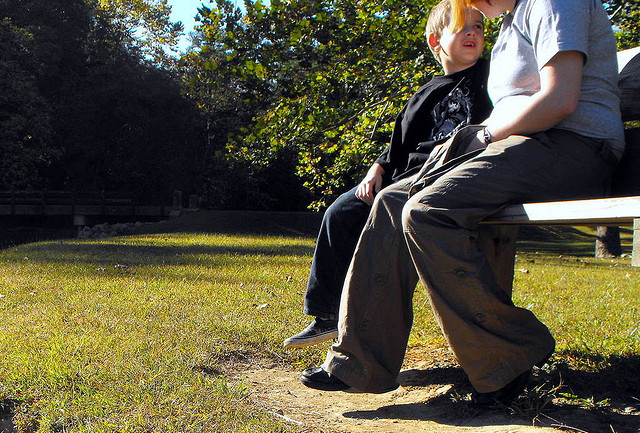My kids and I just got back from a vacation to Colorado. The trip was action-packed: touring the Air Force Academy; exploring the Garden of the Gods; hiking at the Continental Divide; scrambling over boulders as big as cars; horseback riding through the foothills and paddle boating across a mountain lake. Yes, there was a lot of activity, but more importantly, there was a lot of talking. Wherever we went, we talked to each other on the drive and continued our conversations as we hiked/climbed/paddled/explored.
This isn’t really anything unusual for us; the kids and I talk all the time. When they were toddlers, people would comment on how much my kids talked; I blamed it on my being a stay-at-home mom. The kids were my only company so I spoke to them as I would to anyone else. No baby talk, just regular conversation as we went about our daily routine. In the past five years as a single mom, I’ve treasured the time I have with my kids (I co-parent and share time with them with their father) and we continue to have amazing conversations.
Recent discussions with friends reminded me why I find it so important to talk with my kids. Not just ‘to’ my kids, but ‘with’ them. Much of daily life involves moms talking ‘to’ or ‘at’ our kids: Go get your shoes. Get in the car. Pick that up. Come to the table. Wash your hands. If we aren’t careful, we can fall into this pattern of managing our kids without building real relationships. This is a dangerous road to go down, because kids who don’t open up to their parents when they are little are unlikely to suddenly confide in them during the challenging years of being teens and young adults. If we want to develop those relationships, we need to keep a few key concepts in mind. While it is important for both parents to bond with their kids, as a mom I am addressing this primarily to my fellow moms.

Don’t make your child go to extremes to get your attention.
- Be Available: While on vacation, the kids and I stopped at a deli for lunch. As we ate, we talked about what we had done and what we wanted to do next. While we were chatting, a couple walked in with their two children. As they sat down, they plunked two tablets and headsets on the table. Their children, between 5-7 years old, eagerly reached for the devices. While my kids and I continued our lunch, I noticed that while the parents spoke to each other, neither attempted to speak to the children, who spent the entire meal staring at their tablets while absentmindedly reaching for bits of food. I understand some children have social/developmental issues that make it easier to function with technology for support. Still, most kids tuned out at the restaurant table or watching DVDs in the car on every trip (even a quick ten minute trip across town for groceries) are not doing so out of necessity. They do it because it’s convenient. Give them entertainment and they’re out of our hair. The problem is, when we later decide we want them to chat, they’ve often lost interest. Road trips, meal times and outdoor activities are all ideal times to talk with our kids. They are basically a captive audience during these times and we can take advantage of that to have some great conversations. Best of all, for kids who aren’t natural chatterboxes, being in the car where they aren’t eyeball-to-eyeball with us, or engaging in an activity that gets them moving and not trapped in one spot, can help them to feel more comfortable opening up to us. Of course, the technology trap is a two-way street–if we want them to put down the gadgets and talk, we need to do the same. Kids know when we are listening and when we are merely nodding and uh-huh-ing without really paying attention. We have to be available for our kids so good conversations can take place.
Working on a project together can lead to great conversations.
- Go With the Flow: Any time a parent tries to have conversations about serious topics, it’s hard to do so without seeming forced. To avoid that, we tend to just go with the flow and talk about topics as they present themselves. For example, on vacation my son saw magazine covers at the airport noting Glee star Cory Monteith’s drug addiction played a role in his death. He asked me if that was true, and I said it was. This started a conversation about drugs and how hard it can be to stop once you start, and how dangerous and damaging they are because you can die from using them. As we drove through small towns, the kids noticed some buildings had large green crosses painted on them. They asked me what that meant, which led to a conversation about states legalizing marijuana, and we talked about whether that was a good idea or a bad one. When my daughter has her first period, the conversation will be a lot less awkward because she already knows about periods. One day in a Target bathroom she asked what the “little garbage cans” were for and I told her; she’d already seen me put tampons and pads into my cart many times and had asked me about them, too. In fact, thanks to our family having cattle, the kids already know about eggs, embryos, and how cattle ‘make babies’, so to speak. Talking about these things as they come up in daily life is much more natural and comfortable than forced conversations.
Know when to talk and when to listen.
- No Question is Off Limits: My kids know they can ask me anything. On occasion I may tell them they don’t need to worry about that topic at this time, but I never chastise them for asking. The majority of the time, I do give them an answer. Several months ago, my son came to me asking questions. Boys in the grade above had been shown a “puberty video” at school and were talking about it. So I told my son to ask me anything he wanted to know. We talked about body hair, shaving, even about that time he woke up in the morning and “it” wouldn’t go down until he went to the bathroom. Sometimes it is tempting to change the subject or avoid a topic, but honestly, if we don’t answer these questions, who will? I would much prefer my kids get their information from me or from their dad than to get it only from school or from friends.
Building positive, trusting relationships with our kids while they are young is so important. We should strive to make sure our kids feel comfortable talking to us. I know that in my generation, it was often not that way. Many parents (including mine) did not feel comfortable talking about the tough stuff with their kids, so when we had questions, we often got our information from friends, magazines or television shows. That’s not what we want for our kids. We want them to come to us with questions, and that means we have to make ourselves available, talk about issues as they arise, and help our kids feel safe and secure enough to ask about anything that’s on their minds.



